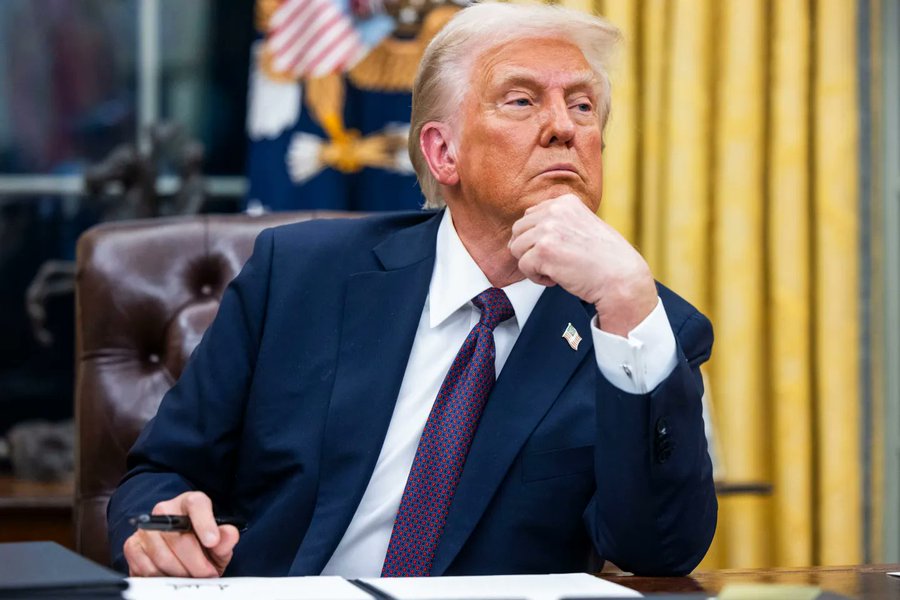Trump Dismisses India’s Reported Tariff Cut Offers as Modi, Xi, and Putin Showcase Multipolar Unity at SCO Summit in Tianjin
U.S. President Donald Trump on Monday slammed what he called India’s offer to reduce tariffs on American imports to “nothing,” saying New Delhi should have acted “years ago.”
His comments come as India faces a 50% tariff burden from Washington, a penalty imposed after Indian Prime Minister Narendra Modi’s government refused to halt purchases of discounted Russian crude oil.
 |
| Image Source: PoliticsVideoChannel |
He argued that while India sells “massive amounts of goods” to the American market, U.S. companies face prohibitive barriers in India.
“It has been a totally one-sided disaster,” he wrote, adding that India “buys most of its oil and military products from Russia, very little from the U.S.”
Trump’s administration first imposed a 25% reciprocal tariff on Indian exports in early August and then added a further 25% levy targeting Russian crude imports, bringing India’s total tariff exposure to 50%.
The White House has framed the move as a necessary step to stop what it calls “indirect funding of Russia’s war effort.”
New Delhi has rejected the claim, insisting its energy purchases from Moscow stabilize global markets and comply with international law.
Low energy tweet. Donald Trump sadly trying to show that he has upper hand with India whereas he has been cornered.
— Harsh Gupta Madhusudan (@harshmadhusudan) September 1, 2025
Flat out lie too “offered to cut their tariffs to nothing”. No. And Indo-US trade including services, education, rerouting, royalties etc is balanced.
Low energy. pic.twitter.com/sTzgra0LrY
The sharp rhetoric shows a dramatic reversal in U.S.–India ties, which was once billed as a cornerstone of Indo-Pacific cooperation.
While Trump maintains that the United States will ultimately “win” the trade battle, New Delhi has accelerated its pivot toward Eurasian partners.
That shift was visible in Tianjin, where Prime Minister Modi met both Chinese President Xi Jinping and Russian President Vladimir Putin on the sidelines of the Shanghai Cooperation Organisation (SCO) Summit.
Modi and Xi welcomed the “positive trajectory” in bilateral ties since last year’s disengagement along the contested border, with Modi reaffirming that India and China were “partners, not rivals.”
Xi, marking the 75th anniversary of diplomatic ties, called for the “dragon and the elephant to dance together” and urged both nations to safeguard multipolarity and reform global institutions.
Later, Modi held a high-profile bilateral with President Putin, during which the two leaders reviewed energy, trade, and financial cooperation.
Modi reiterated India’s call for “a durable peace settlement” in Ukraine while underlining the resilience of the “Special and Privileged Strategic Partnership” with Moscow.
Putin, for his part, briefed SCO leaders on his recent Alaska talks with Trump, insisting that the Ukraine crisis stemmed from a Western-backed coup in Kyiv and NATO expansion, not Russian aggression.
The SCO plenary added further weight to the Global South’s messaging. Modi set out India’s three pillars for the grouping--Security, Connectivity, and Opportunity--while condemning “double standards” on terrorism and citing the recent Pahalgam attack as a global alarm.
Xi criticized “Cold War mentality and bullying behaviour” in world affairs, and Putin reaffirmed that UN principles of sovereignty remain “valid and unshakable.”
Analysts say the optics of Modi, Xi, and Putin exchanging warm words in Tianjin while Trump escalates tariff threats shows a new phase of global realignment.
